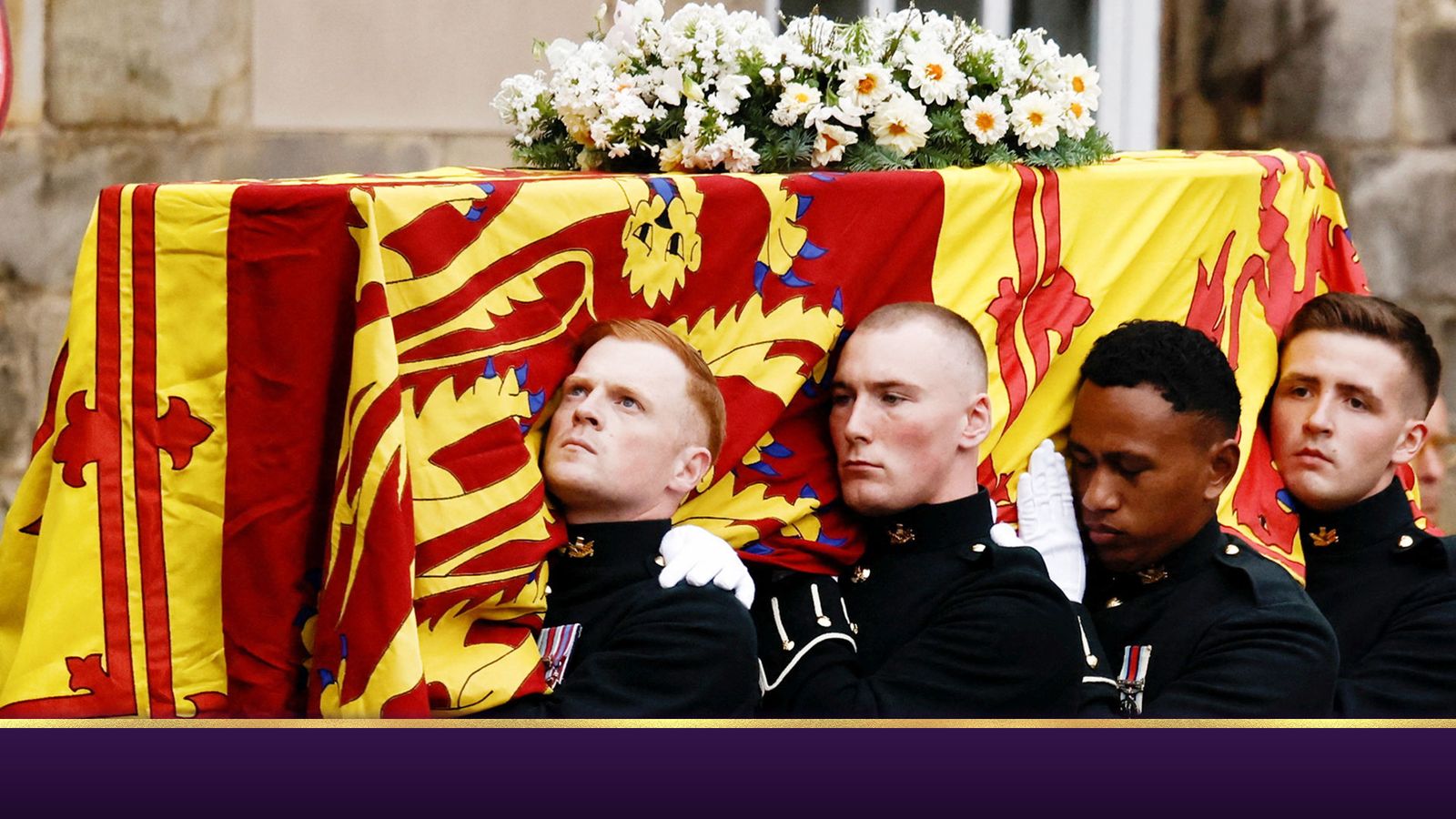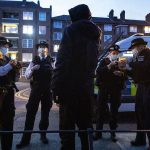The Queen’s coffin has arrived at the Palace of Holyroodhouse in Edinburgh after a six-hour journey on roads lined by members of the public from her Scottish home, Balmoral Castle.
It is the end of the first stage of what her eldest son, King Charles, described as his mother’s “last great journey”.
Details of favourite flowers from Balmoral garden in wreath revealed – live updates
Thousands of people paid their respects to the 96-year-old royal as the hearse went slowly past, with cheers and applause heard as it travelled through Edinburgh’s streets. In some places, packed crowds were more than 10 deep.
Her oak coffin, draped with the Royal Standard of Scotland with a wreath of Balmoral flowers on top, was taken in a seven-car cortege to the Scottish capital.
As it arrived at the Palace of Holyroodhouse, the Queen’s two youngest sons, Prince Andrew and Prince Edward, bowed their heads, as did Edward’s wife, the Countess of Wessex, who also curtsied.
The coffin was then taken out of the hearse and carried inside the building by eight pallbearers, as the royal trio repeated their gestures.
The Queen‘s only daughter, the Princess Royal, also curtsied as she stood alongside her husband, Vice Admiral Sir Timothy Laurence. The couple had been part of the royal procession travelling in a limousine directly behind the hearse.
The royals then followed the coffin into the building.
Please use Chrome browser for a more accessible video player
The coffin will rest in the throne room overnight so Holyroodhouse staff will be able to pay their last respects.
On Monday afternoon it will be taken along the historic Royal Mile to the city’s St Giles’ Cathedral where there will be a service.
The procession will feature the Queen’s four children following behind on foot, along with Sir Timothy Laurence.
Please use Chrome browser for a more accessible video player
The Queen Consort, Camilla, and the Countess of Wessex will follow by car and also attend the service.
There will be a Vigil of the Princes featuring the King and other royals, and the Queen will then lie in state, where the public will be able to pay their respects for 24 hours.
Public viewing of the coffin begins at 5pm on Monday, but people have been warned of long waits, and photography and recording is strictly prohibited.
During the journey from Balmoral to Edinburgh, some mourners threw flowers at the hearse, while others had tears in their eyes, describing the occasion as “very emotional”.
The cortege left the estate around 10am before passing through a number of villages, towns, and cities.
The first was Ballater, the village closest to Balmoral, where many locals considered the Queen as a neighbour.
Hundreds lined its main street, as the cortege passed slowly.
Please use Chrome browser for a more accessible video player
Elizabeth Taylor, from Aberdeen, shed tears as she considered what she had just seen.
She said: “It was very emotional. It was respectful and showed what they think of the Queen. She certainly gave service to this country, even up until a few days before her death.”
Another woman told Sky News she had driven eight hours from Cheshire to get to the village. She said: “I just wanted to be here today to wave her off. She’s been the constant figure in the whole of my life.
“It’s brought together all the losses of the last few years.”
More on the Queen:
What happens between now and the Queen’s funeral?
How the Queen adapted to Scotland’s shifting politics
The secrets behind some of the Queen’s most famous photos
In the town of Banchory, crowds again came out in large numbers, with some people clapping the cortege as it went by.
Sky’s royal commentator Alastair Bruce said: “A wonderful salute from Banchory, quiet gentle applause and a few of them throwing flowers into the path of the hearse.”
Around two hours into its journey, it arrived in the city of Aberdeen, where large crowds fell silent as they watched the cortege pass. Many people brought their children to bear witness to the historic moment.
The Princess Royal will fly to London with her mother’s body on Tuesday.
The events in Scotland are the first meticulously planned steps leading to the funeral at Westminster Abbey on Monday 19 September – a day that will be a bank holiday.






















